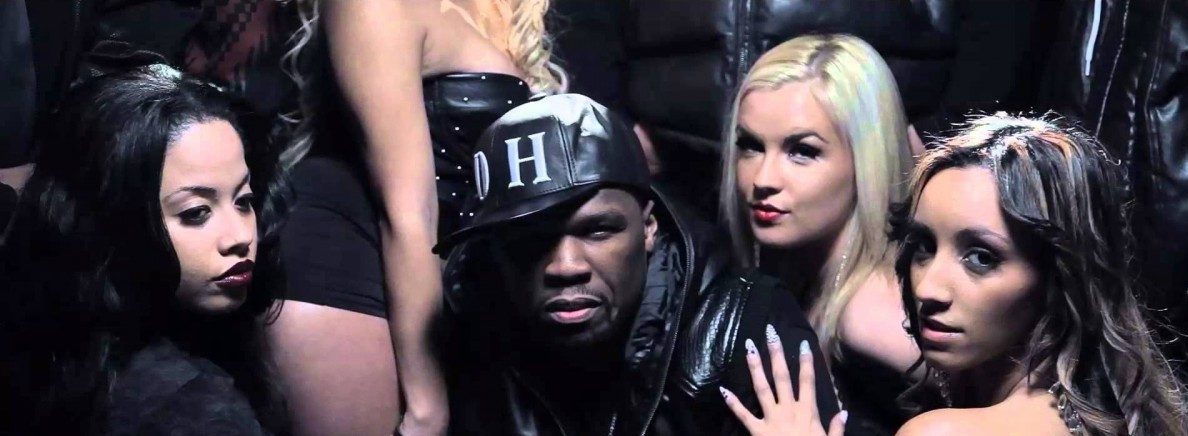“Hip-Hop’s Mr. Nice Guy”
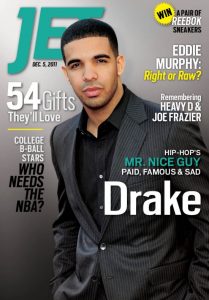
Drake is known as the “nice guy” of the rap/hip-hop industry. His lyrics are often about women, from the past or present, which he usually presents in a humanizing manner. Contrasted with the objectification we see in most other areas of hip-hop, he is a relative bright spot in an industry where we often see a central theme of dehumanizing and commoditizing women in both lyrics and especially music videos (case in point Action Bronson and his song “Consensual Rape”). His lyrics are catchy, his popularity transcends the main rap demographic of young males, and for the most part his message is about respecting women.
This characterization is both supported on and off the stage- he talks about his close relationship with his mother, he’s a close friend of Nicki Minaj, and he has not been involved in any major scandals. Drake’s “rap superpower [is] the admission of a beating heart,” (1). Ironically, his openness to talk about his emotions, a weakness for a normatively masculine figure, became his shield and source of strength.
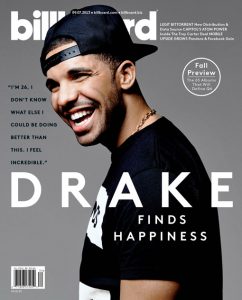
Just because he is the least of all evils when doesn’t mean all of his lyrics convey positive messages. If we take a deeper look into Drake, we can see that he is not necessarily consistent in his message of equality and respect towards women. In his last two albums, he only featured one female artist. He frequently shames female sexuality and autonomy in songs like “Hotline Bling”, where his lyrics about controlling women masquerades as concern and his narcissism masquerades as vulnerability.
“Hotline Bling”
Video – https://www.youtube.com/watch?v=uxpDa-c-4Mc
Lyrics- https://genius.com/Drake-hotline-bling-lyrics
“Hotline Bling” is peak Drake. It’s catchy, popular, and about his past relationship with a girl and his grief after she moves on. The music video went viral and has viewed 1.2 billion times on YouTube. Even our current president and commander-in-chief did a parody of “Hotline Bling” on SNL.
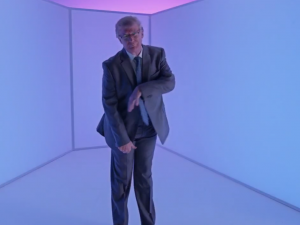
Its popularity overshadows some of its troubling themes while he raps and sings about a former fling embracing her body and confidence since he left her. He does follow Hip-Hop/Rap themes surrounding the objectification and hyper-sexualization of women in many of his videos, and Hotline Bling is not an exception.
The first scene is a hotline center, conveniently staffed by a bunch of models, answering phone calls as if they were “booty calls”. This sets up the tone his song where the male plays the role of the “caller” and the female plays the role of the passive “receiver”.
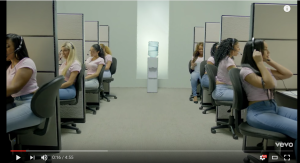
“Ever since I left the city,
You got a reputation for yourself now”
“Ever since I left the city,
you started wearing less and goin’ out more
Glasses of champagne out on the dance floor”
“Ever since I left the city…
Going places where you don’t belong”
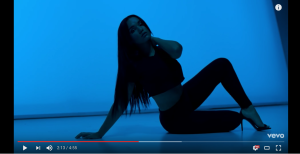
Using the anaphora of “Ever since I left the city”, Drake paints a picture of a girl who has found her own autonomy since the end of their relationship. She goes out, drinks, hangs out with new friends, and now no longer fits into the “good girl” group that Drake refers to.
“Used to always stay at home, be a good girl
Youwas in a zone, yeah
You should just be yourself
Right now, you’re someone else”
He is very controlling about her actions, what she wears, where she goes, and whom she hangs out with. He made her into who she is, and despite him leaving her, he believes she is still his to come back to and command.
“Good Girls”
Drake’s approval of women revolves around his traditionalist notion of a “good girl”. His group of “good girls” creates the binary complement group of “bad girls” which subtly reinforces that promiscuity, confidence, and independence are negative traits of the ideal feminine figure. Drake is here to save his former “good girl”, whether or not she wants it.
In “Growing Up Female in a Celebrity-Based Pop Culture,” by Gail Dines, she argues that these popular messages have a far-reaching and toxic impact on our culture. “They take on an aura of such familiarity that we believe them to be our very own personal and individual ways of thinking” (436). Drake’s platform and popularity allows him to have large influence on our own individual ways of thinking. The notion of an ideal female figure continually reinforces itself through instances like this because many women are compelled to fit their perception of the ideal female and men are compelled to date their perception of the ideal female.
Drake as the “Least of all Evils” in the Hip-Hop Industry
Again, I firmly believe that Drake is the least of all evils in comparison to the rest of the male rap/hip-hop music industry. He has defended himself from criticism surrounding his lyrics. He told Katie Couric:
“There’s a fine line between demeaning… And fun, and wit. A lot of the music that me and Wayne made, for example…it’s fun, it’s witty. ‘I Wanna F*** Every Girl In The World,’ that’s one of our biggest songs. Is it to be taken literally and dissected? No. It’s more just fun, witty moments. Hip-hop has elements of comedy. Those make the best punch lines… I feel like to demean a woman is something completely different than what we do.”
Drake preaches one path and often practices another. Is it malicious? Does Drake firmly believe he does not demean women in songs like “Hotline Bling” or reinforce a paternalistic culture? Or does he just write songs that he believes will be catchy and successful? “ If the former is the case, then Drake is to blame. If the latter is the case, then there is something to be said about what the industry itself encourages, what type of artists it looks for, and what kind of songs it creates. Ultimately, they only push what they know we, as the consumers, will buy.
Sources:
